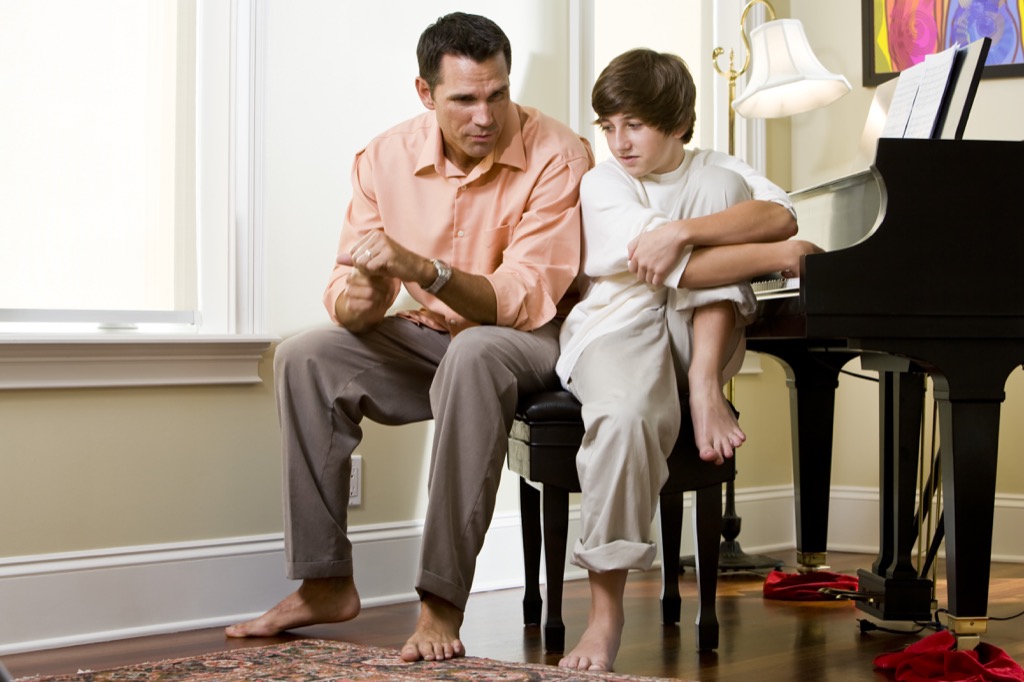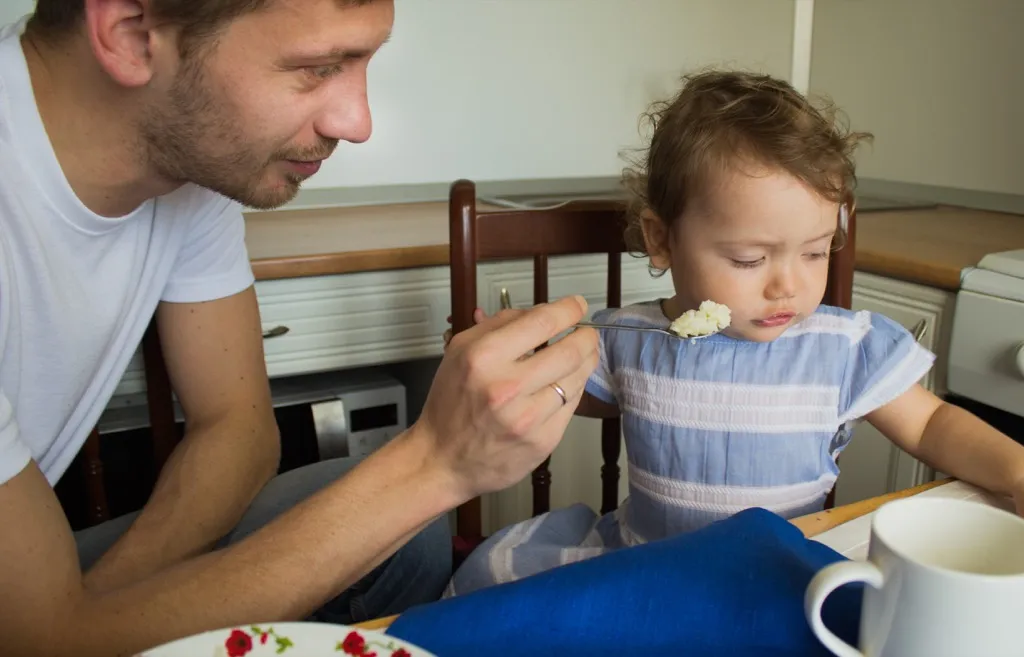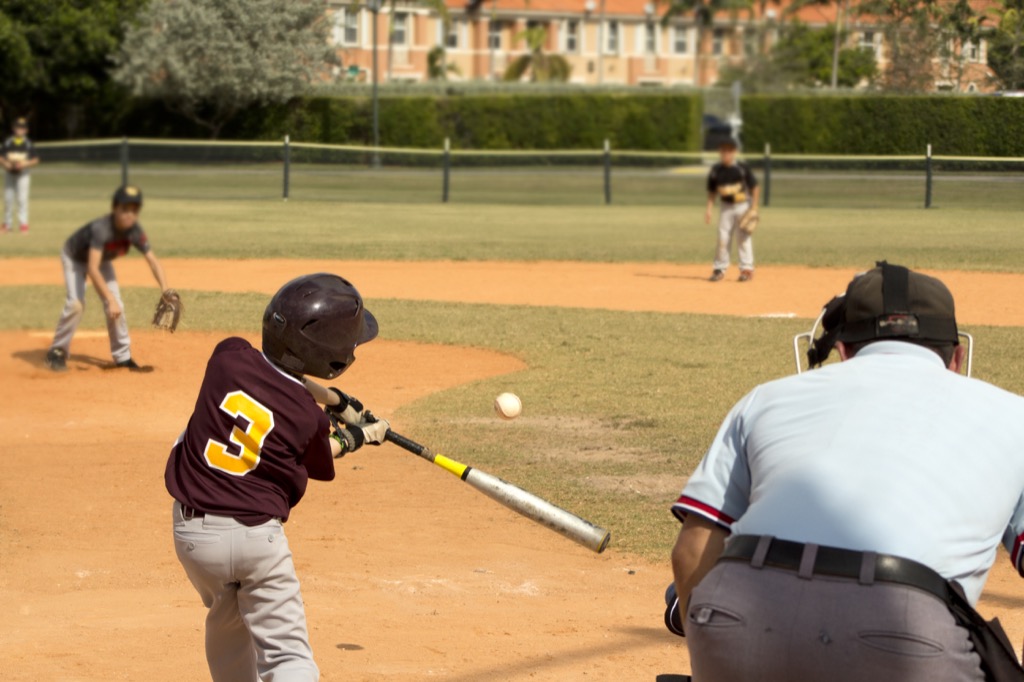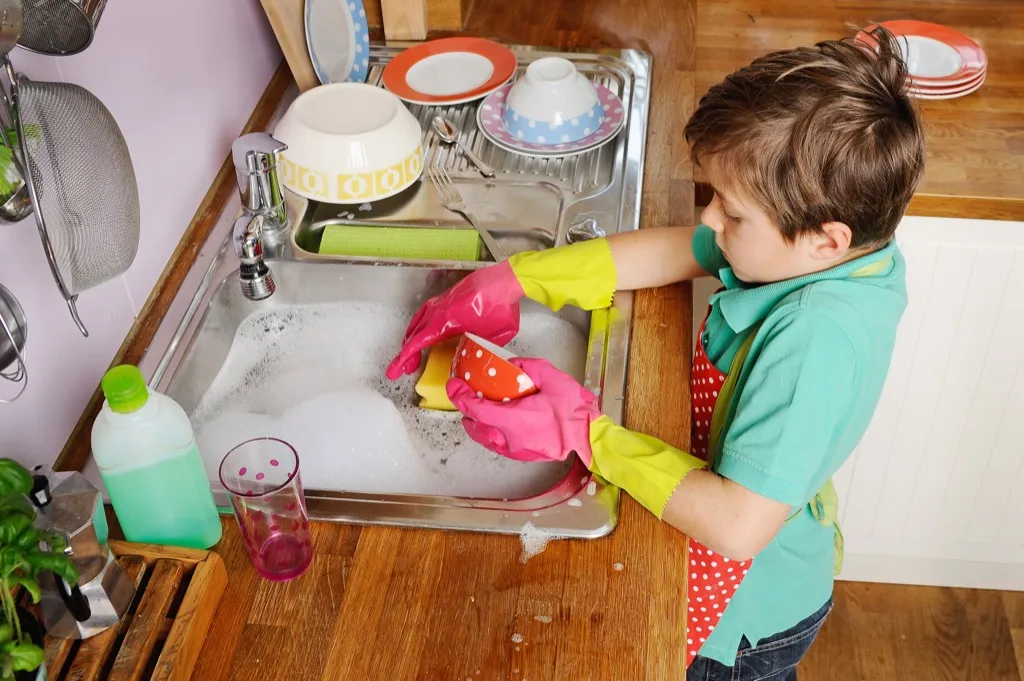20 Easy Ways to Be a (Much) Better Father
A good father has to be part coach and cop, preacher and teacher, friend and foe.

The 18-year task of raising a child from birth to adulthood is one of man's most noble journeys—and greatest challenges. One moment, you're figuring out how to build a crib and plastic toys, and in a blink, you're waxing on about the dangers of Fireball shots.
What makes fatherhood most complicated is not just the constant barrage of decisions, pressures, and circumstances that demand your attention. ("No, Ms. Principal, I'm not aware that Bart sketches Greek statues of naked men and women in his textbook during class.") It's that every family is an experiment involving so many variables.
Every child is different, and so is every father. You've got sporty dads and artsy dads. Serious dads and goofy dads. Tough dads and pushover dads. Meaning: What you may think is best for your kid because of who you are may not actually be the case because of who they are.
A good father has to be part coach and cop, preacher and teacher, friend and foe. And he has to walk that tightrope with two goals in mind: One, help create a dynamite kid. And two, develop a relationship that will last a lot longer than the 6,574 days of their childhood. So the question becomes: How do you navigate all the tricky terrain that comes with parenting, disciplining, teaching, and bonding so that you do what's best for your kids in the long run, while also ensuring that you end up on the good side of their memories, and not the "he was such a prick" one?
It's not about making 180-degree changes in parenting philosophy or in personality traits. It's about doing the little things—the things that teach them, that entertain them, that challenge them, and that show them that you give two hoots. After all, a child's mind is one big game of connect-the-dots. Every dot you put in their memory is what forms the big picture.
"It's the little moments that mean the most. Kids don't need big flashy experiences," says Catherine Pearlman, Ph.D., assistant professor at Brandman University in California and author of the parenting book, Ignore It! "They need deep relationships with caring adults." The best way to do it, she says: With your time. When kids feel as if dad is paying attention, that's when the best fathering happens.
Here, 20 small ways to make a pretty big difference. And for more on fatherhood, take some tips from these 11 leading men who happily embraced parenthood later in life.
1
Shut. It. Off.

According to the Pew Research Center, 48 percent of fathers say they spend too little time with their kids. That's all the more reason to resist your check-your-phone habit when you are with them. "Dads almost never put their phones down," Pearlman says. "Even brief breaks pay huge dividends." When you're engaged with your kids, ditch your device—so your children get the message that your eyes and mind are with them and not with what J.J. Watt is tweeting. And for tips on putting the phone down, check out the 11 Easy Ways to Curb Your Smartphone Addiction.
2
Talk a Lot When They're Little

Talk out loud, talk to yourself, talk to them, read them books. Even when they're of the age when they'll have no idea what "hmm, we're out of mustard" means, it's good for their brains for you to say it out loud, rather than just think of it. One study found that a father's vocabulary had a stronger effect on a child's language development than a mother's. And for more ways to be a better father, check out the 5 Ways Cool Dads Make Family Dinner A Lot More Awesome.
3
Use the Crib-Cry Rule—Even When They're Teens

Many parents advocate letting babies cry it out in their cribs—to help self-soothe and learn to fall asleep on their own. That same philosophy works with older kids (without the crying and without the cribs). When your child gets upset at you ("Dad, you're the only one who won't let me wear ripped jeans!"), your inclination may to be to engage in a verbal battle of rights and wrongs. The better play? Walking away for a moment.
"If I get frustrated, I just leave the room for a few minutes. It lets me re-group and then jump back in," says Jason Greene, founder of One Good Dad. "Men in particular want to be defensive, step up to the plate and start swinging. But if you step out of the batter's box and calm down, you can better try to fix things." Besides quelling the specific situation, it pays other dividends as well. A British study found being a calm father is related to having more intelligent children. And if your little ones are stressing you out, check out these 10 secrets for beating stress in 10 minutes (or less!).
4
Create "Your" Game

One day, Greene took his son to play work on soccer drills in an urban handball court. They passed the ball around, but it evolved into the two of them playing handball rules with a soccer ball. That game started organically, but is now a tradition that's theirs and only theirs.
5
Engage, Maverick, Engage!

From day one, embrace everything that comes with fatherhood—diapers, debates, decisions, diarrhea duty, all of it. A British study found that when men were confident about their role in parenthood—especially their role as father in the early years—that led to fewer behavioral problems as adolescents. And if you're looking for ways to be a better husband, too, memorize the 20 Compliments Women Can't Resist.
6
Don't Whine About Work

While it's good to share work conflicts with your partner, think about what happens if every family dinner consists of you complaining about knucklehead executives. You're showing your kids that work is something to be despised. But if you can speak of what you love about you do, you're teaching them to do what you ultimately want them to do—to pursue a career that they're passionate about. And for more career advice, see these 52 Easy Ways to Be Better with Money in 2018.
7
There's a Time for "No Rules"

Unlike most aspects of our lives where we expect a winner and loser (sports, politics), playing with your young kids doesn't always have to have an outcome. So no, you don't always need to keep score. That means more playgrounds, more hikes, and more make-it-up-as-we-go-along games. One study shows that fathers who play with their kids in this way have to deal with fewer behavior problems down the line.
8
Do More Chores

Being diligent about cleaning the peanut butter off the spoon before putting it in the dishwasher isn't just about having an equitable distribution of household chores. The fact that you do laundry, clean toilets, make dinner, and know exactly where the eff the Lysol is stored communicates something bigger. A Canadian study found that daughters grow up with greater career aspirations when the fathers share more of the work around the house. And remember: uttering the phrase "I'm on chore duty" is one of the 20 Things She Always Wants You to Say.
9
Tradition Trumps Grandiose

Kids will remember a lot about growing up. Favorite teachers, first pets, the time you embarrassed them by wearing Crocs to a parent-teacher conference. But they'll also remember the actions that became traditions. One friend of mine takes his son to the Waffle House before school on the first Friday of the month. Another friend chooses one day a year—randomly—when he takes a wrong turn on the way to school and plays hooky at the amusement park.
10
Follow These Rules

Expose them to a variety of foods early—unless one of those foods is a grape Fanta. Slip them a $5 somtimes just because—unless you suspect it will become beer money. Embrace the power of puppies—unless you already have three of them. Always have a spare phone charger on hand—unless they've already lost or broken three of them. Dance with them—unless you're a chaperone for their prom.*
*Do not be a chaperone for their prom
11
Zip It

The most toxic environment in the world, besides #politicaltwitter: The sidelines of a youth sporting event. That's mainly because there's a subset of parents who think that their mission at that moment is hooting from the stands with advice, instructions, and ump-hating snipes. The best thing you can do—as hard as it is—is to let the coaches coach and the refs ref. And the children play. "Kids are now constantly looking to the sidelines for feedback instead of focusing on the coaches and playing," Pearlman says. The result: They feel micromanaged and criticized, she says, when they thought they were supposed to be doing something fun. In effort to make them better in sports, parental yappiness is the exact thing that drives them away.
12
Put 'Em to Work Early

Want to prepare them for life responsibilities? (Nod your head yes.) Put them in the kitchen. Even 2-year-olds can help stir the scrambled eggs. "It was important for my wife and me for our kids to learn how to cook; we read that Millennials are getting out of the house and not knowing how to cook," says Greene, who has four kids (the oldest of whom is 13 and just made spaghetti dinner for the family).
13
Harness the Power of Their Phones

Kids and their phones. They have so much access—to everything. Instead of being paranoid about them being exposed to the horrors of the world, do what one of my friends does: Use sensitive moments that they'll see on social media as talking points about race, violence, harassment, politics, whatever it is. After all, if you've made the decision that they're old enough for a smartphone, you've made the decision that they're old enough to see anything that may pop up on it.
14
Ask More, Decide Less

Dad is the default decision-maker when it comes to play time. But instead of saying, "wanna play H-O-R-S-E?" try this: "What do you want to do?" Pearlman says, "Dads often dictate the terms of play. Time together is even more meaningful when dads play what the child wants to."
15
Adapt Your Discipline

There's some thinking that your discipline style has to be consistent all the time. But some research indicates that you ought to be more pliable—adjusting how you react to the behavior, not the mandated household rules. An Oklahoma State University study showed that sometimes kids need punishment while other times negotiation leads to a better outcome. (Of course, the key is to be on the same page with the other adult in your household before you dole out the disciplinary decisions.)
16
Rock On with the Silly Faces

When fathers are the jokers, they often get dismissed as not taking family life seriously, or that they're avoiding the real issues, or that they're just trying to make peace rather than resolve issues. But studies show that dads who can make young children laugh, even during stressful times, actually benefit their emotional development.
17
Take Them to a Place Where Nobody Speaks Your Language

Greene says he loves taking the family to non-English-speaking countries, because it helps them develop other skills in independence, as they have to try to order food or navigate transportation systems (provided the parents involve them in the action, which he and his wife do). One of his favorite stories: On a bus in Barcelona, everyone got on, but the family got separated because it was so crowded.
From afar, Greene saw his son, 11 at the time, get out of his seat and offer a seat to an elderly woman. She spoke broken English, and he spoke broken Spanish, so it took some time for the woman to figure out what he was doing. When she did realize, the two started conversing the best they could. "It was a really nice moment between two people with nothing in common," Greene says. The lesson for the kids: "You can handle pretty much anything after you've been to a strange place," he says. "Things don't seem that big when you come back home." And to help you or your kid speak a second language fluently, check out The Secret Trick for Learning a New Language Quickly.
18
"Next To" equals "Talk With"

Greene spends quality time with his kids in side-by-side activities: Playing video games with his son and getting a mani-pedi with his daughter. Both situations, he says, gives them a relaxed and easy way to talk. "Those will be nice memories for the two of us spending time together having out nails done, sitting and talking for 30 minutes about whatever is on her mind."
19
Use Various Teaching Tools

Many fathers want to pass along their wisdom by giving straight advice: Do this because this is what works. That's all well and good, but you can be more effective but altering your styles the professional advice-givers do. Preachers tell stories and let the audience reflect on the meaning. Teachers ask questions to allow the students come up with the answer themselves. Not every piece of advice has to come loudly and directly from the all-caps FATHER.
20
Think for a Second About the End Game

Not every decision you make will be welcome. You won't always be liked. And sometimes, you'll have more conflict than Roger Goodell's inbox. But in the end, no matter what you go through, you do want your kids to turn out well—and know that you cared. So maybe, when things get tough, it would help to think back on a popular fatherhood quote that appears in the book, The Book Thief by Markus Zusak: "Sometimes I think my papa is an accordion. When he looks at me and smiles and breathes, I hear the notes." Which, in the end, is probably how we'd like all of our kids to feel. And to seriously up your dad game, be sure to learn the Best Way to Raise Emotionally Healthy Kids.
Ted Spiker (@ProfSpiker) is a professor and chair of the department of journalism at the University of Florida.
To discover more amazing secrets about living your best life, click hereto sign up for our FREE daily newsletter!





















